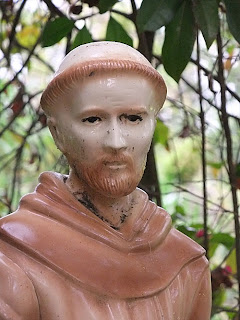What are we waiting for?
Genesis 28:10-19a
Psalm 139: 1-11, 22-23
Romans 8:12-25
Matthew 13:24-30,36-43
Earlier this week, I was complaining how impenetrable this week's lectionary readings are. At first glance, Genesis is a bridging passage between two important stories (and doesn't tell the whole story of Jacob's encounter with God); who can tell what the hell Paul is talking about except that we're hoping for something we can't see because if we could see it wouldn't be hope -- which is more indicative perhaps of either Paul not being imaginative enough or drunk or a deeper wisdom (hmmm....); and the parable in the Gospel is all about judgement and casting into flames all the evil doers of this world ... or is it?
In last Sunday's Grantchester, Sidney Chambers is asked why God can't simply answer a question and he says "but then it wouldn't be faith". He ends up having a crisis of faith himself.
So what ARE we waiting for? What is this hope?
Let's start with Genesis. Have you ever had a God experience? Some movement of the Holy Spirit? Or you sensed the presence of God, that let you know that not only is God real, but you belong to God. Perhaps it was an inarticulate covenant, or even a whisper of what lies beyond. If you have, then you have experienced what Jacob did in this passage, with angels ascending and descending and God speaking to him. Paul has clearly also experienced this holy moment but lacks the vocabulary to describe it, as we all do. That "looking through a glass darkly" at God's promise to us.
The thing about God experiences is that they have the potential to transform us, and for us to become part of God's in-breaking of a new earth and a new heaven. Paul's road to Damascus is the most dramatic and obvious example, but Jacob's story is also one of transformation. Gods's promise is "I am always with you" in addition to the promise he gave to his grandfather Abraham of promising him land and becoming a father to the nations.
Jacob's awareness of this promise is transformative, because even as Jacob himself is tricked, and in turn continues his trickery, Jacob grows to trust God and so his yetzer-hara for always getting the best bargain (an admirable Middle Eastern trait) can at last be kept in check for him to pray to God for help in reconciling with his brother Esau.
In the gospel, the parable of the weeds is Jesus telling us a most loving story, although at first glance it looks nothing like.
It's not about smoking weed either.
On the face of it, Matthew's explanation of this parable brings to mind good people vs evil people, or chosen vs denied, not to mention hell and damnation. Maybe Jesus did tell this parable but the interpretation was something other than what Matthew chooses.
Maybe this parable is not about the body of Christ (as in those who make up the people of Christianity) or the "true" followers of Jesus, but about our own body in Christ. Is this what Paul is also trying to get at with the Holy Spirit bringing our desires out of evil and into moderation?
For as the last verse into today's beautiful psalm says:
"Look well whether there be any wickedness in me *
and lead me in the way that is everlasting."
The entire psalm speaks of God knowing us inside and out, before we were even conceived, of knowing our strengths and our weaknesses. Jesus too, as the Son of God, knows each of us inside and out: the potential for fruitfulness (wheat) and the potential for destruction (weeds).
Breaking a bad habit is difficult, improving ourselves is hard. There can be much wailing and gnashing of teeth before the new habit, the new way of being becomes a part of us.
If God took away all the weeds the minute we received the Holy Spirit, that would also take away our free will that we were created with. If God had taken Jacob's trickster-self away, how would Jacob have ever been able to leave Laban and return home? Further, as the farmer in the parable says, what is good about us would be badly damaged and we'd be unable to fully grow into God's kingdom; and so new life grows alongside old ways of living, transforming us into new beings.
We cannot change on our own. We need the awareness of God with us but not even with the Spirit of God in us can we tame our out-of-control desires, although with God's help, we can get closer to that fruition.
I believe that each time we fall away from God and let the yetzer-hara get out of control again, the crop tended by God doesn't fail but God waits for us to return.
So this is what we are waiting for: it's not judgement, it's rescue, it's transformation, reconciliation and restoration.
And with receiving the Spirit of God, we have the potential to transform, to become Sowers of God's kingdom. (See last week's blogging the lectionary.)
God longs for us to turn and return to God again and again and each time we do, the good wheat grows a little more and a little bit of the kingdom of heaven peeks into earth.
Maybe, just maybe that is what this parable means and that is what we wait, we hope and long for.



Comments
Post a Comment
Thank you for taking the time to leave a comment.